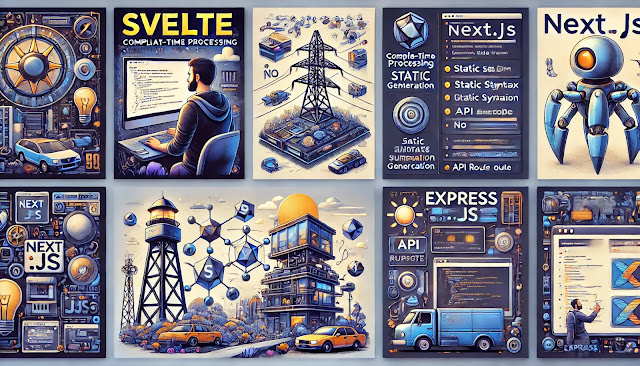Top JavaScript Frameworks to Learn for Web Development
When it comes to web development, choosing the right
JavaScript framework can significantly impact your productivity and the
performance of your applications. Here are some of the top JavaScript
frameworks worth learning in 2024:
1. React
React, developed by Facebook, remains one of the most
popular JavaScript frameworks for building user interfaces. It utilizes a
component-based architecture that makes it easy to create reusable UI
components. React's virtual DOM improves performance by minimizing direct
interactions with the actual DOM.
- Key
Features:
- Component-based
architecture
- Strong
community support and ecosystem
- Extensive libraries for state management (like Redux) and routing (like React Router)
2. Angular
Angular is a platform developed by Google for building web
applications. It provides a comprehensive solution with features such as
two-way data binding, dependency injection, and powerful templating
capabilities. Angular is particularly suitable for building complex single-page
applications (SPAs).
- Key
Features:
- Comprehensive
framework with built-in solutions
- Two-way
data binding simplifies data management
- Strong
typing with TypeScript enhances code quality
3. Vue.js
Vue.js is gaining popularity for its simplicity and
flexibility. It offers a gentle learning curve, making it accessible for
beginners while still being powerful enough for advanced users. Vue's reactive
data binding system and component-based architecture are among its key
strengths.
- Key
Features:
- Lightweight
and easy to learn
- Flexibility
in integration with existing projects
- Excellent
documentation and community support
4. Svelte
Svelte is an innovative framework that shifts much of the
work to compile time rather than in the browser. This results in smaller bundle
sizes and faster performance. Svelte's syntax is clean and intuitive, allowing
developers to write less boilerplate code.
- Key
Features:
- No
virtual DOM, resulting in faster performance
- Easy-to-understand
syntax and structure
- Highly reactive nature simplifies state management
5. Next.js
Next.js is a React-based framework that provides server-side
rendering and static site generation capabilities. It’s particularly suited for
building optimized, high-performance applications and enhances SEO, which is
crucial for web applications.
- Key
Features:
- Built-in
server-side rendering
- Automatic
code splitting for better performance
- API
routes for easy backend integration
6. Express.js
While primarily known as a web application framework for
Node.js, Express.js is essential for full-stack JavaScript development. It
simplifies the process of building robust APIs and web applications by
providing a minimalistic set of features.
- Key
Features:
- Lightweight
and unopinionated, allowing flexibility
- Middleware
support for enhanced functionality
- Strong
community and ecosystem
Conclusion
Learning these frameworks can greatly enhance your web
development skills and career prospects. Each framework has its strengths and
is suited to different types of projects. Whether you prefer the
component-driven approach of React, the full-featured structure of Angular, or
the simplicity of Vue.js and Svelte, there is a framework that will meet your
needs.
To stay updated on these frameworks and explore deeper
insights, you can check out resources from reputable tech websites like MDN Web Docs,
freeCodeCamp, and Stack Overflow for community-driven discussions and
comparisons.





0 Comments